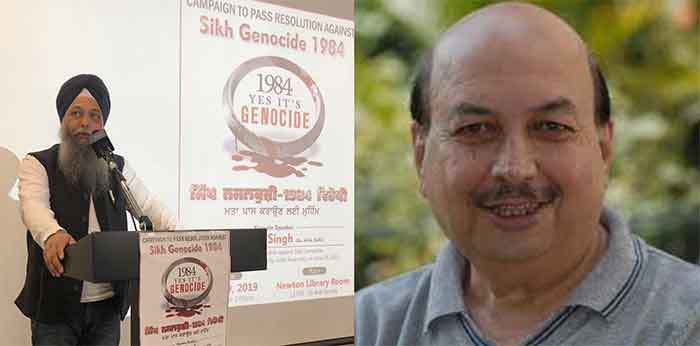
The year 1984 saw two major catastrophes in the world’s so called largest democracy; first a brutal massacre of one single community, and then the biggest industrial disaster of its time, thus turning George Orwell’s imaginative year of totalitarianism into reality.
In the first week of November, 1984 thousands of Sikhs were slaughtered across India after the assassination of then-Prime Minister Indira Gandhi by her Sikh bodyguards. Then in December, a gas leak at the Union Carbide pesticide plant that left many dead.
Not only were these incidents preventable, but the government remained complicit in both cases.
37 years later, two journalists who tried to make the Indian establishment answerable for these calamities have died due to COVID 19 complications.
Jarnail Singh passed away on May 14, and Rajkumar Keswani died exactly a week later, on May 21, 2021.
Singh had burst into the limelight for throwing a shoe at India’s then home minister, P. Chidambaram during a press conference in 2009.
He had protested after one of India’s most powerful politicians refused to answer repeated questions about attempts to shield those involved in the Sikh massacre of 1984.
At the time of the incident, Singh worked for the Dainik Bhaskar daily paper. Interestingly, Kewani lately worked with the same publication.
Keswani was a whistle-blower, who had forewarned about the accident through his writings much before the gas leak in Bhopal. Unlike Singh, who later went into politics after being sacked from his job, Keswani continued to work as a journalist. Singh was only 48, while Kewsani died at the age of 71.
That the Indian government was responsible for the tragedies which shaped the future of these two men is well documented.
In New Delhi alone, close to 3,000 Sikhs were murdered by the mobs led by the slain leader’s Congress party, with the help of police.
Gandhi’s bodyguards were seeking revenge for the army invasion on the Golden Temple Complex, the holiest Sikh shrine, in June of that year.
The ill-conceived military operation was ordered to deal with a handful of armed militants inside the place of worship. The invasion left many pilgrims dead, and important historical buildings were heavily damaged.
Chidambaram, a minister in the Congress-led government, expressed his satisfaction in 2009 over the “clean chit” given to party leaders involved in the massacre.
Keswani has been writing consistently about the gas leak that killed more than 3,000 people in Bhopal.
His articles on safety lapses at the Union Carbide plant were first published in 1982 for a different newspaper, two years before the tragedy. The one warning about potential disaster was written in June 1984 for another publication, six months before the deadly gas leaked out during the intervening night of December 2-3, 1984.
The Congress government back then had compromised public safety, in spite of warnings about the plant being located near residential areas. Much as in the case of Sikh massacre, it helped the top company officials involved to go unpunished.
The victims of both episodes have been fighting for justice and closure, despite the fact that in the highly polarized environment, an attempt was made to cover up the Bhopal case by falsely blaming it on the Sikhs.
The untimely deaths of Singh and Keswani during these difficult times. when bigotry and corporate control have grown under India’s right-wing Hindu nationalist regime. is a huge loss not only to journalism, but to humanity at large.
Gurpreet Singh is a journalist
GET COUNTERCURRENTS DAILY NEWSLETTER STRAIGHT TO YOUR INBOX











































